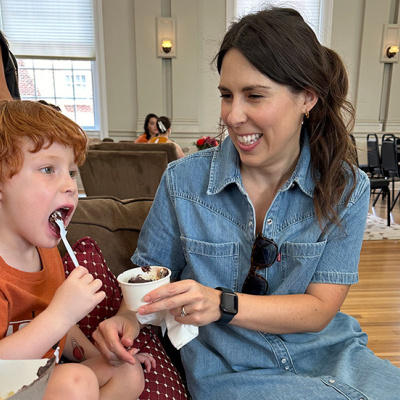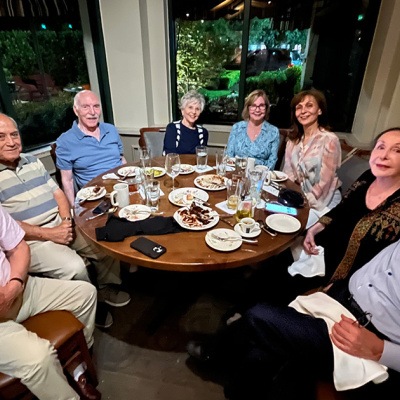"Be Fearless": LadyMafia Connects Women in Tech

Women are still woefully underrepresented in science and technology (STEM) fields—one recent study found that only 27 percent of STEM workers are female. Women of color are even rarer in STEM: the National Science Foundation found that only 2 percent of STEM workers are Hispanic or African-American women.
Enter Aminatou Sow, BA ’07, and a humble little listserv called Tech LadyMafia.
After graduating from UT, Sow took a job as director of digital engagement with a nonprofit, Iraq and Afghanistan Veterans of America. She quickly grew tired of seeing the dismal statistics on women and STEM, so she teamed up with a friend also working in tech, Erie Meyer, to start connecting. What began as an email chain with a few dozen friends has now grown to include 1,000 women from all over the world. From advice on negotiating salaries to just sharing accomplishments, it's a far cry from the stale networking mixers of the past.
At age 28, Sow was recognized as one of Forbes' "30 Under 30" in technology. She chatted with the Alcalde about her work—and how her time on the Forty Acres helped her get there.
How did you first become passionate about women in technology?
I have really cared about technology for the majority of my life. I grew up being really good at math and science, but decided to go into liberal arts. I think that the whole time I was in college [studying government at UT] and when I graduated, what really struck me was, why did I not pursue this, why did I not think I was good enough? It wasn't until after my very first job that I realized that tech would be a viable career option for me.
How has Tech LadyMafia grown?
When we started it, it was just me and a really good friend of mine sending emails to a couple dozen women that we knew, and now we have seen it grow to almost 1,000 people. Everyone is connected to each other somehow, which just goes to show how much of a demand there was. Even though you hear all these statistics about how there are no women in technology, I realized that that wasn't true in my own life. So I emailed these women I knew, and it showed that even if you think there are few people who look or think like you in your field, it’s your responsibility to find the ones that do and to connect with them.
What advice do you have for young entrepreneurs?
To be fearless. You don’t know that you can do something unless you try. Really try and connect with people that think the same and want to do the same thing as you. It’s so important to not feel threatened by people and instead to be generous with your time and your ideas and to collaborate with them. That’s how you make a way for yourself and that’s how you can change things.
Tell me about your work with Iraq and Afghanistan Veterans of America.
I am the director of digital engagement at IAVA. It’s the first and the largest nonprofit for people who are coming back from both of those conflicts. I work on everything from the website engagement to managing our social media platforms and our email marketing program, as well as coming up with cool, innovative ways for our veterans to connect.
Can you recall anything during your time at UT that particularly influenced you?
When I was at UT, I was a part of the Texas Spirits on campus, and I got to meet some really impressive young women. I grew up not having very many girlfriends because there were so few girls at my tiny high school. Joining the Spirits profoundly changed my life. I realized that all of the stereotypes that they tell you about women being catty or not helping each other or not being kind to each other are completely false. I also learned that I didn't need to be intimidated by people. I could build networks across really awesome groups of women on campus, and ultimately, we are more powerful when we work together.
Working with new student services as an orientation advisor really teaches you the same thing: to connect with people and develop critical leadership skills. As a liberal arts student they teach you how to be open-minded about the world, to be a critical thinker, but also to be adaptable. That's what I took away from UT. When I graduated in 2007, we were one of the first classes where not all of us had jobs. I had to learn how to distinguish myself in the marketplace, and technology did that for me.
Another experience that mattered a lot to me when I got into tech was the fact that I was an international student [Sow is from Guinea, and grew up in West Africa and Europe]. International students should realize that UT makes it such a good place for us, and we get an education that makes it possible for us to anything that we want.
You were recently recognized as one of Forbes’ "30 Under 30" in technology. What do you hope to be doing in the next 10 years?
I hope that we are able to grow Tech LadyMafia even more, and to grow our influence and take it all over the world. There is such a demand for women who have these kinds of skills. But on a personal note, I hope to work more with other Longhorns and help them in their own industries. One of the coolest post-graduation experiences has been reconnecting with all of my friends and realizing that we have different missions and interests.






